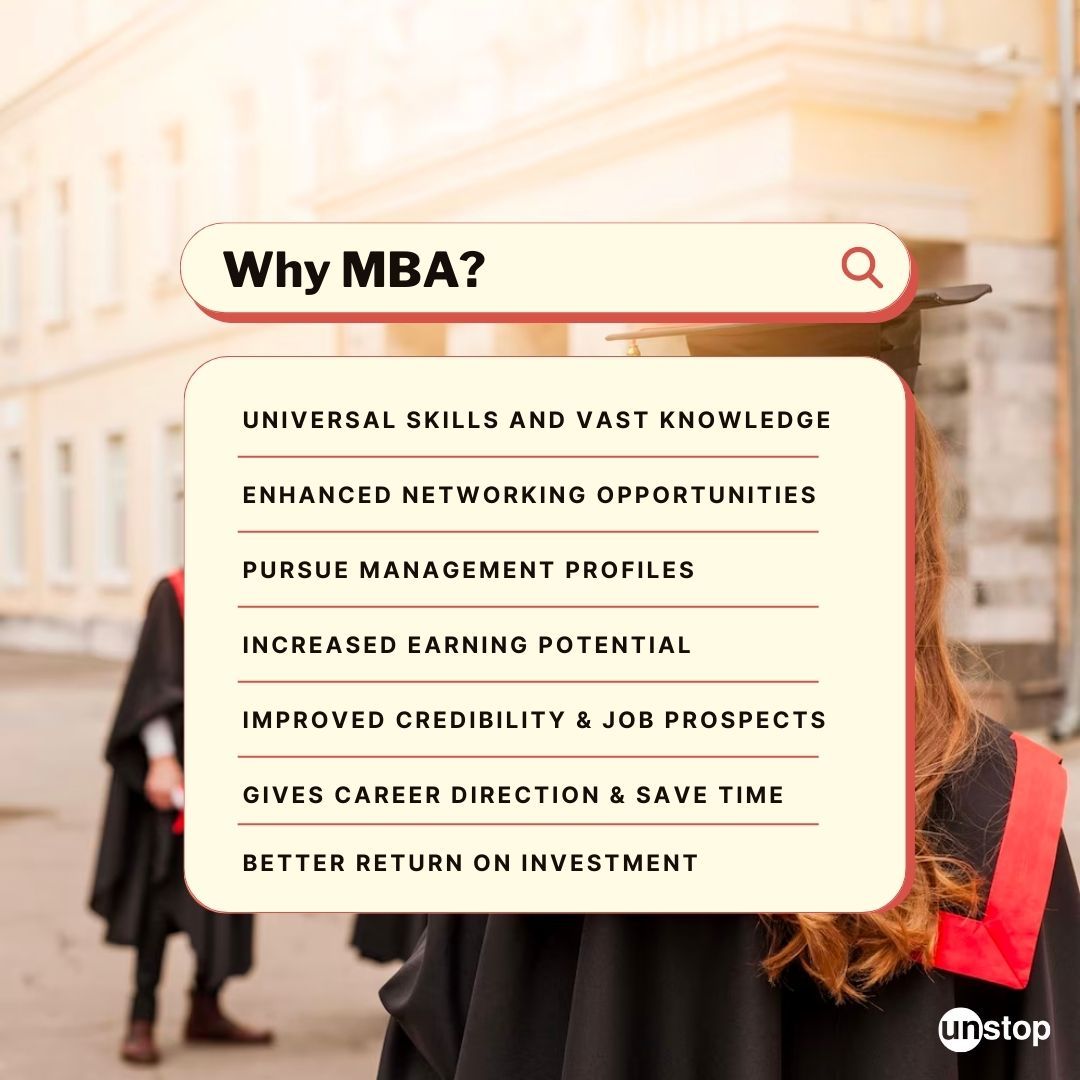- Is MBA After Graduation The Right Choice?
- MBA After Graduation: B-Schools & Programs In India
- MBA After Graduation: Eligibility Criteria
- Entrance Exams For Admission To MBA After Graduation
- CAT Examination: What Is It & Its Purpose
- CAT Examination Syllabus
- The Approach To CAT Exam Preparation
- Frequently Asked Questions
MBA After Graduation | Benefits, Eligibility, How-to, & More!

Are you in the final run of your graduation program? Wondering what to do next? You are not alone. Every year, lakhs of students come face to face with this question. Many of them consider getting a Master in Business Administration, i.e. an MBA, after graduation at some point in time, given the popularity of the course.
Are you, too, wondering if you should get an MBA after graduation? If yes, then you have landed at the right place.
In this article, we will explore the reasons why getting an MBA after graduation (BA, B.Tech, or any graduate degree in arts, commerce, or science) might be the way to go. We'll also discuss various MBA entrance examinations, the CAT exam, its purpose, etc. So let's get started!
Is MBA After Graduation The Right Choice?

It is natural for you to feel indecisive when figuring out the best next step after graduation. While an MBA is one of the most sought-after and prestigious degrees, that alone is not a good enough reason for you to jump into the rat race.
Here is a list of top reasons why getting an MBA after graduation is a good option. Read ahead to make an informed and conscious decision.
Management Profiles
Do you want to pursue managerial positions or explore other management career options? If yes, getting a management degree is definitely the way for you. This is because an MBA not only offers you an impressive educational background and theoretical knowledge but also provides you with management skills and hands-on experience essential for flourishing in a competitive work environment as a leader.
Universal Skills and Vast Knowledge
A career in management is not the only application of management education. You will learn many soft and corporate skills that will help you excel in every sphere of your professional life. It will also help appease your curiosity regarding the business world, corporate culture, and entrepreneurial spirit while addressing your fear of the unknown before you step into the real world.
In addition, it helps students build strategic and analytical thinking abilities while developing business acumen - all of which is essential for those who want to build successful careers, irrespective of the field or industry.
Enhanced Networking Opportunities
The exposure and opportunities for networking that one receives through this postgraduate program are unparalleled. To begin with, students get to participate in enriching conferences, college events, and B-School competitions/case study competitions and gain hands-on experience. These events further give students the chance to connect with industry experts and build a professional network, which will go a long way in their management career.
Increased Earning Potential & Better ROI
According to the National Association of Colleges and Employers (NACE), MBA holders earn an average of $160,000 more than those with only a bachelor’s degree. Another study by the Graduate Management Admission Council (GMAC) found that MBA graduates earn an annual salary that is 3.8% higher than the salary of college graduates without an MBA. This is especially true for managerial positions.
Clearly, an MBA holder gets higher-paying jobs than graduates. In this sense, getting a postgraduate degree, especially an MBA, also provides a better return on investment.
Improved Credibility & Job Prospects
One of the reasons why graduates don't get good salary packages is the lack of credibility in the corporate world. Also, a graduate degree might not always be enough to help you stand out in the competitive job market. Getting an MBA after graduation can sort these issues out.
The MBA curriculum caters to the needs of a fast-paced corporate world and equips you with the practical knowledge to solve the problem statements of various businesses. Getting an MBA after graduation signifies academic rigour and competency on the part of the individual. It sends the right signals to potential employers and improves credibility & job prospects.
Gives Career Direction & Save Time
Not all fresh graduates clearly understand what they want to do and the segment they want to build a professional career. In this case, pursuing an MBA after graduation is better than taking a break year. You can get a better sense of what you really want to do while working towards your MBA degree.
MBA After Graduation: B-Schools & Programs In India
Multiple business schools (B-Schools) in India offer a wide range of MBA programs and an array of specialization courses. Selecting which B-School to attend is a decision that must be made after properly considering a number of factors like specializations offered, curriculum, location, placements, etc. Also, there are multiple rankings that adjudge global and Indian institutions on these parameters. You can refer to these rankings to gather more information and choose what is right for you.
Check out the - QS World University Ranking 2024, FT Global MBA Ranking, Economist MBA Rankings, and NIRF Rankings 2023.
Average Cost of MBA Programs
The average cost of MBA programs in India can vary significantly depending on several factors, similar to global trends:
- Program Type: Full-time MBA programs are generally more expensive than part-time or executive MBA programs.
- Institution: Prestigious institutions like the Indian Institutes of Management (IIMs) or top private universities typically have higher costs.
- Location: MBA programs in major cities like Mumbai, Delhi, or Bangalore often come with higher living expenses.
Here's a range for the average cost of MBA programs in India:
-
Total Cost: The cost can range from ₹26,000 (around $320) to ₹27,00,000 (around $33,000). This includes tuition fees, course materials, and living expenses. However, for top-tier programs, the cost can even reach ₹30,00,000 (around $37,000).
Here's a breakdown based on program type:
- Tier 1 MBA Programs (IIMs, Top Private Universities): These programs often range from ₹14,00,000 to ₹27,00,000 (around $17,000 to $33,000).
- Tier 2 & 3 MBA Programs: These programs can cost anywhere between ₹5,00,000 to ₹15,00,000 (around $6,000 to $18,500).
- Government Colleges & Distance Education Programs: Some government colleges and distance education programs offer affordable options, with fees as low as ₹37,800 (around $470).
Duration of MBA Studies
- Full-time MBA: Typically lasts for 2 years, with some programs offering a 1-year accelerated option.
- Part-time MBA: Can range from 2 to 4 years, depending on the program structure and course load per semester.
- Executive MBA: Designed for working professionals and often takes 1.5 to 2 years to complete, with classes offered on weekends or evenings.
Learning Modes for MBA Courses
- On-campus: This is the traditional classroom-based learning mode, with lectures, group discussions, case studies, and presentations.
- Distance Education: Provides flexibility for students to complete coursework online or through self-learning materials, often with periodic on-campus sessions or exams.
- Blended Learning: Combines on-campus sessions with online components, offering a balance between traditional classroom learning and flexibility
Available MBA Concentrations
Some common specializations are:
- Finance: Focuses on financial management, investment analysis, and corporate finance.
- Marketing: Covers marketing strategies, consumer behavior, market research, and branding.
- Human Resource Management (HRM): Equips students with skills in talent acquisition, employee relations, and performance management.
- Operations Management: Teaches efficiency and optimization principles in production, logistics, and supply chain management.
- Information Technology (IT): Combines business acumen with IT skills, focusing on e-commerce, data analytics, and information systems management.
- Entrepreneurship: Provides knowledge and skills for starting and managing new ventures.
These are just some of the most common concentrations. Many universities also offer specialized programs in areas like healthcare management, international business, and business analytics, depending on their focus and faculty expertise.
MBA After Graduation: Eligibility Criteria
If you have decided to pursue an MBA after graduation, the next step is to ensure that you meet the eligibility criteria. Here are the general criteria:
- The candidate must have a minimum 50% aggregate score in an undergraduate degree from an accredited university/institution.
- Must have attained the minimum required score in the management entrance exam preferred by the university/ institution. The various admission exams are mentioned ahead.
- Candidates initially shortlisted based on merit must clear a GD round and an interview round to get admission to business schools.
- Those who wish to pursue an MBA after graduation outside of India must clear GMAT, IELTS/TOEFL, etc. exams, along with any other specific exam, as required by those universities.
Entrance Exams For Admission To MBA After Graduation in India
Some of the most popular and widely accepted management entrance exams are:
| Common Admission Test (CAT) | Xavier Aptitude Test (XAT) |
| IIFT | Management Aptitude Test (MAT) |
| MICA Admission Test | Symbiosis National Aptitude Test (SNAP) |
| NMAT | TISS NET |
| Graduate Management Admission Test (GMAT) |
Read for more information - MBA Entrance Exams In India
Some universities also conduct individual admission examinations for those willing to pursue an MBA after graduation. So read the fine print carefully!
CAT Examination: What Is It & Its Purpose
The CAT exam is one of the most popular management admission tests accepted by the nation's widest range of management institutes. Every year, lakhs of students participate in the selection process to realize their dreams of getting into top management institutions and building successful careers in management. The purpose of the exam is to facilitate admission to top institutes. It is organized annually in the month of November by the Indian Institutes of Management.
CAT Examination Syllabus
The CAT exam syllabus is split into three sections, namely, Data Interpretations & Logical Reasoning (DILR), Verbal Ability & Reading Comprehension (VARC), and Quantitative Ability (QA). While the general topics covered under these sections remain the same, the weightage for them and the number of MCQs varies every year. The tentative CAT syllabus and pattern 2024 will be released soon. In the meanwhile, you can check out the syllabus and pattern for 2023 to get a broad idea about the same - Details About CAT Syllabus 2023- Everything You Need To Know!
The Approach To CAT Exam Preparation
Two of the most important factors in your approach to CAT exam preparation are- a plan/ timetable and resources. Irrespective of how much time you have, if you are taking coaching or not, it is extremely important to have a plan/ timetable in place.
Preparing a timetable and giving due importance to each section is important if you want to cover the whole syllabus. As for the resources, there are many highly recommended books that you must consider, along with the past year's question paper.
Check out the links provided below to learn more about how to prepare for CAT:
Studying MBA Internationally
Embarking on an international MBA journey involves several key steps:
- Research: First, research and select the right program that aligns with your career goals, considering factors like curriculum, faculty, location, and global reputation.
- Prepare: Next, prepare for and take standardized tests such as the GMAT or GRE, which are commonly required for admission. Concurrently, gather necessary documents, including transcripts, letters of recommendation, a resume, and a well-crafted statement of purpose.
- Submissions & Interviews: Once you've compiled your application materials, submit them to your chosen institutions before their deadlines. If shortlisted, you may be invited for in-person or online interviews.
- Analyze Acceptances: After receiving acceptance offers, evaluate them carefully, considering financial aid options and scholarships that can offset tuition costs.
- Secure Visa & Admission: Finally, secure a student visa for the country where you’ll be studying, arrange for accommodation, and prepare for your move abroad.
Throughout this process, staying organized and proactive is crucial to ensure a smooth transition into your international MBA program.
Hopefully, after going through this comprehensive guide, you have a better idea about what it takes to get into a B-School and pursue an MBA after graduation.
Frequently Asked Questions
Q. What is the career trajectory or scope of an MBA after graduation?
An MBA opens doors to a diverse range of careers across industries. Early on, graduates might find themselves in consulting, finance (investment banking), product or marketing management, or business operations. With experience, they can progress to senior management roles or even general management positions, overseeing entire company functions. The chosen MBA concentration and industry focus can influence this trajectory. In the long term, MBAs can reach executive positions (CEO, CFO, COO) or serve on boards of directors.
Remember, an MBA is a stepping stone. Your career success hinges on the skills you develop, the experience you gain, and your strategic planning for the future. By continuously learning and refining your skillset, you can leverage your MBA to achieve your long-term professional goals.
Q. What are the average salaries for those who get an MBA after graduation?
There is no fixed average salary amount across industries for graduates and MBAs. While graduates can fetch competitive salaries, the average salary is usually higher for MBA degree holders.
Check out some placement reports for top B-School/ MBA programs in India- FMS Delhi Final Placement Report 2023, IIT Roorkee MBA Placement Report 2023, and IIFT Placements 2023.
Q. Which specialization can one go for in an MBA program?
MBA students can opt for various specializations, given their interests, job prospects, etc. Some common and comparative popular specializations are MBA in Human Resources, MBA In Business Analytics, MBA in Marketing, MBA in Accounting, MBA in Finance, MBA in General Management, MBA in Operational Management, etc. Thinking through your decision before zeroing in on a specialization is best.
Also read - Books For MBA Students In Every Specialization
We hope this helps you in making the right decision about pursuing an MBA after graduation. #BeUnstoppable
You might also be interested in reading the following:
An economics graduate with a passion for storytelling, I thrive on crafting content that blends creativity with technical insight. At Unstop, I create in-depth, SEO-driven content that simplifies complex tech topics and covers a wide array of subjects, all designed to inform, engage, and inspire our readers. My goal is to empower others to truly #BeUnstoppable through content that resonates. When I’m not writing, you’ll find me immersed in art, food, or lost in a good book—constantly drawing inspiration from the world around me.
Login to continue reading
And access exclusive content, personalized recommendations, and career-boosting opportunities.
Subscribe
to our newsletter















Comments
Add comment